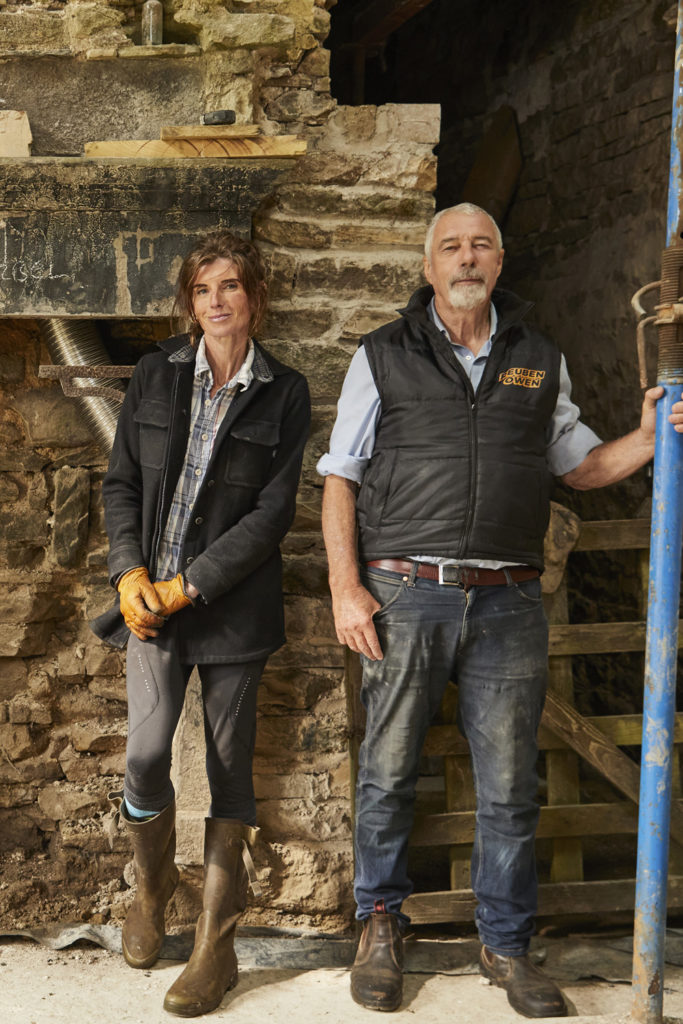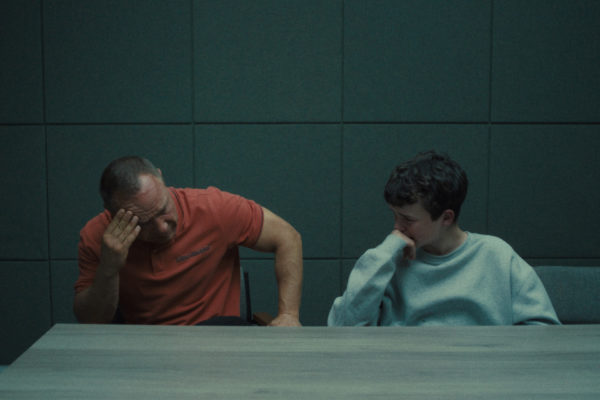
Plebs Meets The White Lotus In Netflix’s The Decameron – Review
By
9 months ago
All episodes are streaming now on Netflix
What do you get if you cross ITV’s slapstick ancient Roman comedy Plebs with HBO’s The White Lotus, and set it in mediaeval Florence? Something a lot like Netflix’s The Decameron. Loosely based on Giovanni Boccaccio’s 14th century short story collection of the same name, the eight-part series is streaming now on Netflix. Here’s what we thought of it.

(L to R) Tony Hale as Sirisco, Karan Gill as Panfilo, Lou Gala as Neifile, Douggie McMeekin as Tindaro, Saoirse-Monica Jackson as Misia, Zosia Mamet as Pampinea, Tanya Reynolds as Licisca, and Amar Chadha-Patel as Dioneo in Episode 103 of The Decameron. Giulia Parmigiani/Netflix © 2023
Review: The Decameron, Netflix
Florence, 1348: The Decameron drops us in the midst of the Black Death, a gory pandemic presented in a style reminiscent of golden era Horrible Histories. Think skin bubbled with bursting boils, toilet humour, and dirty streets overflowing with dead bodies. Splice this with some compelling class conflict, raging sex hormones and slapstick humour, and you’ve pretty much bottled The Decameron’s aura.
While it has been described in run-up promotional material as a mediaeval Love Island – ‘A lot of drama, a lot of sex, a lot of craziness,’ summarises star Jessica Plummer – this comparison belies the series’ depth. It does, though, give due credit to this mediaeval comedy’s unexpected timeliness. ‘When the COVID-19 pandemic happened, I wanted to figure out how to write about it and the things I was noticing in our culture with a little bit of ironic distance,’ explains series creator and showrunner Kathleen Jordan. ‘It occurred to me that the plague is a good breeding ground for some of those thematic conversations.’
While each episode is far too long to keep your attention (a lesson for streamers: just because there are no schedule-related time limits for sitcom episodes, doesn’t mean they should run for longer than 30 minutes), The Decameron is silly yet zany and sharp, and certainly worth a watch.
What the first episode lacks in zip and pace, it makes up for in amusing exposition: four duos are being drawn together, escaping Florence for ‘the beautiful, not infected countryside’ thanks to an invitation from lord of the Villa, Leonardo. We quickly, piece by piece, realise each duo has a dark truth nestled behind its prim facade, with gloomy motives equally looming – including even affable Villa steward Sirisco (Tony Hale).

(L to R) Leila Farzad as Stratilia, Douggie McMeekin as Tindaro, Zosia Mamet as Pampinea, Saoirse-Monica Jackson as Misia and Tony Hale as Sirisco in Episode 105 of Decameron. Giulia Parmigiani/Netflix © 2024
Girls’ Zosia Mamet is our Pampinea, the unselfaware soon-to-be-lady of the Villa, keen to meet her betrothed for the first time – and to look her unblemished best while doing so. Despite her Renaissance costumes (designed by Gabriella Pescucci and Uliva Pizzetti), Pampinea is the image of a modern Cali girl: image obsessed, eager to host a party, and sickened by her own ancient age (28), speaking in an affected millennial droll. On her journey to the Villa, Pampinea is joined by codependent servant Misia (Derry Girls’ Saoirse-Monica Jackson), who is eager to please even beyond her own means, positioning herself in competition with the Villa’s permanent staff, Sirisco and Stratalia (Leila Farzad). Like all involved, Misia harbours a secret of her own – and it is this preoccupation that keeps her nose from sniffing out what Sirisco and Stratalia are hiding…
As devout duo Neifile (Lou Gala) and Panfilo (Karan Gill) trundle through the countryside to the villa, their conversation draws amusing resonances with certain, ahem, recent events. ‘Why would God send the pestilence upon us?’ Neifile cries. ‘Is the world coming to an end?’
Her comforting husband – Gill embodying charisma in the role – replies, ‘Well, I admit, the world does seem a bit grim at the moment. To think, they had to cancel the Feast of Saint Michael, the social event of the season. Has this pestilence no mercy?’ The sentiment is, of course, very familiar – and those parallels with Love Island ring true in moments such as this (remember a certain coterie of influencers fleeing the UK to holiday in Dubai during lockdown?).
Neifile continues: ‘Sister Benedict says this is all a test from God. We have to remain as holy as possible. But what if we fail that test?’
‘Darling, if the pestilence is a test from God,’ Panfilo replies, ‘our invitation to the villa is our deliverance, no doubt reaped by your diligent praying.’ And thus begins our introduction to this lovingly wed yet celibate couple. (And we soon become overfamiliar with their techniques for satiating those inevitable desires.)

Amar Chadha-Patel as Dioneo in Episode 102 of Decameron. Courtesy of Netflix © 2024
Journeying to the Villa, we also have demanding, petty and occasionally cruel noblewoman Filomena (Jessica Plummer), the last surviving member of her family, joined by doting yet unappreciated servant Licisca (Tanya Reynolds), who has the series’ strongest sense of right and wrong yet perhaps the least conviction to do anything about it. Giving bread to a dying peasant on route to Filomena’s dismay, Licisca briefly escapes the confines of her rank to reprimand her mistress, declaring: ‘Jesus didn’t believe any person deserved bread more than another.’ Naturally, Filomena reprimands her, but Licisca’s virtue is irrevocably clear – a note expanded on as the action progresses, bringing a necessary depth to an otherwise raunchy romp.
Finally, we have sickly and shy nobleman Tindaro (Douggie McMeekin), who turns out to be an epic mansplainer – a timeless trait indeed. He is joined by Dineo (Amar Patel) who – with his long beachy waves water-soaked and flicked, in one scene, in Bond-style slow motion – is the mysterious object of affection for many of the Villa’s new residents. Frustratingly, his motive as doting doctor to the insufferable Tindaro soon becomes a little too obvious (as you might assume, his motives aren’t pure). But his scene-stealing presence is a welcome step-change, bouncing pleasingly off McMeekin’s meek Tindaro.
It’s all based on Giovanni Boccaccio’s 14th century short story collection of the same name, which begins with a similar arrival of a group to an isolated Villa. Boccaccio lays the ground for storytelling, the group meeting each night to exchange gripping tales, and while the TV series’ group amuses eachother with tall tails, we see a darker comedy play out on Netflix. ‘It is loosely inspired by the book,’ Jordan confirms. ‘For each of the characters in the show, I pulled something from the original book character with that name. But as we took it to the writer’s room and it became its own thing, I think our characters ended up being much more dimensional.’
More dimensional they are – and with each episode comes more depth, more grit. But the unexplained maintenance of native accents like Mamet’s American and Jackson’s Irish creates a vivifying air of freedom which scents the whole show (along with the sickness and excrement). It almost feels like watching a play within a play as an ensemble cast wiggles into their ill fitting characters, somehow making it all work.

(L to R) Jessica Plummer as Filomena and Tanya Reynolds as Licisca in Episode 101 of Decameron. Giulia Parmigiani/Netflix © 2024
Back in the first episode, it’s only a matter of hours before Neifile’s unblemished view of God and the church is challenged, her beloved Cardinal Agnolo declaring in a moment of crisis that ‘God has abandoned us’. But staying true to levity in the darkness, when attacked by looting outsiders, these unwieldy nobles panic, screaming, running, throwing apples. Meanwhile, caught in a ruse by Panfilo, Licisca compellingly declares: ‘You know we’re all going to die right? I assure you we are, and sooner than you think. So I appreciate your concern, but I’m going to do what I like in the time I have left.’ And thus begins the sex fuelled romp we were promised, Lisisca’s words and Neifile’s fears echoing through each episode, each decision they make. Outside, however, the plague rages on – and, in tandem, the action turns a note darker.
With this pandemic backdrop, The Decameron is timely, yet it hasn’t come too soon – it resonates, but not too closely. As a result, as comedy should, we can glimpse ourselves in the mirror.
WATCH
All episodes of The Decameron are streaming now on Netflix. netflix.com







